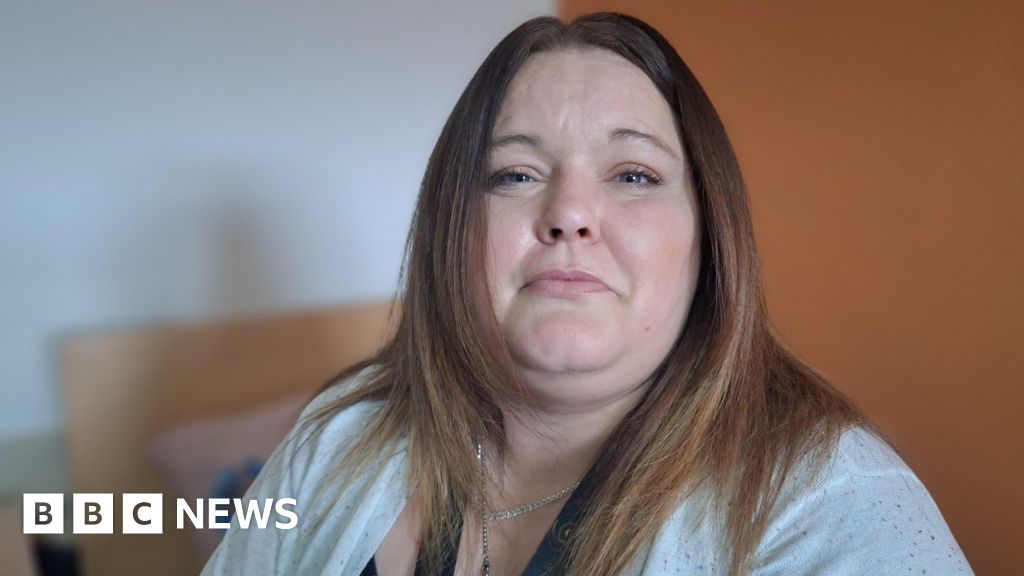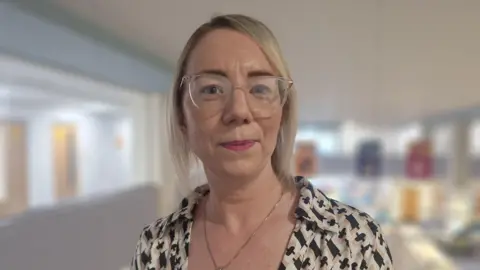
 BBC
BBCCharmaine Denton has been waiting more than two years for a permanent home and she is far from the only one.
The 38-year-old is “scratching at the door” to move after three years in supported housing, which she said had affected her mental health and left her feeling like her life was on hold.
Homelessness is at a record level in Wales and the number using temporary accommodation, such as B&Bs, has risen by 18% to 6,447 in 2023-24.
Charmaine, from Carmarthenshire, said: “I was hoping to put up my own Christmas tree this year. I just want somewhere to call home – that’s what everyone deserves, isn’t it?”
She moved into care when she was three and had a chaotic childhood.
By 14 she was living in temporary accommodation and had her first flat two years later.
“I wasn’t ready to be self-reliant and run my own property. I don’t think many 16-year-olds are,” she said.
She takes full responsibility for her actions but said a lack of support and a life of chaos led to her taking heroin and crack cocaine.
“You don’t recognise you’re going to be really heavily into drugs when you’re 16, you just think it’s one big party.”
She lost her flat, went to prison, slept on the streets and lived in temporary accommodation.
“It was hard trying to stay clean there. I’m not blaming anyone, but there’s only so much you can keep away from it when people are fighting in the hallway and they’re up at three in the morning, knocking your door flat out.”
Now Charmaine lives in a shared recovery-focused house run by homeless charity, The Wallich.
Hers is one of nine rooms with a bathroom and kitchenette and she is proud to have changed her life and wants to give something back.
“My past made me stronger, I don’t look at it as bad – I look at it as experience. I’m hoping I can turn it round into a positive,” she added.
She wants to continue voluntary work but cannot until she finds a permanent home.
This year will be her fourth Christmas in temporary accommodation.
Jamie-Lee Cole from The Wallich said Charmaine’s situation was an example of the bottleneck in temporary accommodation where there was a “swelling” of people needing it but with nowhere to move them on to.
She said as well as the effect on Charmaine’s mental health, for some there was a risk of relapse or reoffending.
Newport, the fastest-growing city in Wales, has the highest homeless rate in the country – it has risen by more than 50% over the past year to a record 1,359 households.
In September 2024, 594 households lived in temporary accommodation at a cost of £6.5m to the city’s council, up £1.4m on the previous year.

Thursday mornings are busy at the housing drop-in service at Newport Central Library.
Housing advice and prevention officer Hannah Berry said: “People can be very angry, upset, frustrated… they just want a home.”
She said the hardest part of the job was turning people away and “we do our very best to help everybody, but we’re restricted by budget, lack of housing, lack of provision and lack of other services”.
As a mother herself, she said it was particularly difficult to see families with children “facing the toughest thing in their lives”.

Kath Howells from Newport council said Wales was feeling the brunt of the housing crisis, with private rented homes too expensive for most people and a lack of other options.
She said high demand and a very low turnover of housing association stock meant they could not “move people into the homes they need and deserve”.
She encouraged people at risk of losing their home to speak to the council as quickly as possible.
Steffan Evans from The Bevan Foundation said the percentage of social homes as the total of the housing stock had almost halved in 40 years.
“We know that the Welsh government has got its 20,000 affordable homes target… but that target can’t be the end, we need to go further than that,” he said.
The Welsh government said tackling homelessness was a priority and it had “allocated record levels of funding” since 2021 – £1.4bn – and was investing nearly £220m in homelessness prevention and housing support this year.
A spokesman added: “The increase in people being supported with temporary accommodation reflects the ongoing pressures within the system and the effects of the cost-of-living crisis on individuals and households.”




